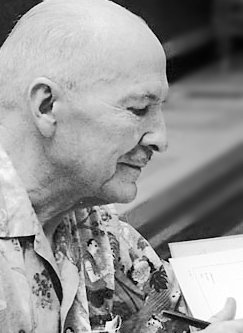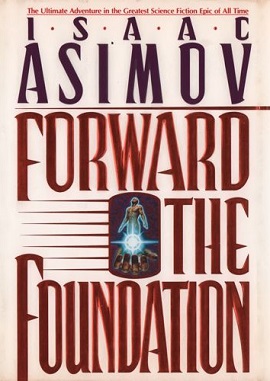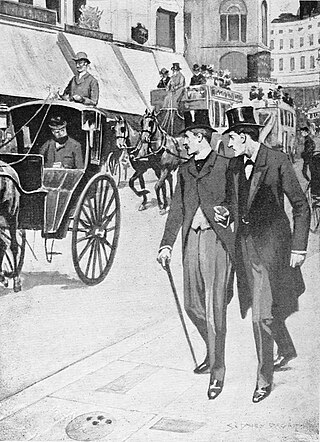
John Wood Campbell Jr. was an American science fiction writer and editor. He was editor of Astounding Science Fiction from late 1937 until his death and was part of the Golden Age of Science Fiction. Campbell wrote super-science space opera under his own name and stories under his primary pseudonym, Don A. Stuart. Campbell also used the pen names Karl Van Kampen and Arthur McCann. His novella Who Goes There? was adapted as the films The Thing from Another World (1951), The Thing (1982), and The Thing (2011).

Robert Anson Heinlein was an American science fiction author, aeronautical engineer, and naval officer. Sometimes called the "dean of science fiction writers", he was among the first to emphasize scientific accuracy in his fiction, and was thus a pioneer of the subgenre of hard science fiction. His published works, both fiction and non-fiction, express admiration for competence and emphasize the value of critical thinking. His plots often posed provocative situations which challenged conventional social mores. His work continues to have an influence on the science-fiction genre, and on modern culture more generally.

John Griffith Chaney, better known as Jack London, was an American novelist, journalist and activist. A pioneer of commercial fiction and American magazines, he was one of the first American authors to become an international celebrity and earn a large fortune from writing. He was also an innovator in the genre that would later become known as science fiction.
" '—All You Zombies—' " is a science fiction short story by American writer Robert A. Heinlein. It was written in one day, July 11, 1958, and first published in the March 1959 issue of The Magazine of Fantasy & Science Fiction after being rejected by Playboy.

The Gunslinger is a dark-fantasy novel by American author Stephen King. It is the first volume in the Dark Tower series. The Gunslinger was first published in 1982 as a fix-up novel, joining five short stories that had been published between 1978 and 1981. King substantially revised the novel in 2003; this version has remained in print ever since, with the subtitle RESUMPTION. The story centers Roland Deschain, the last gunslinger, who has been chasing his adversary, "the man in black," for many years. The novel fuses Western fiction with fantasy, science fiction, and horror, following Roland's trek through a vast desert and beyond in search of the man in black. Roland meets several people along his journey, including a boy named Jake, who travels with him part of the way.

A whodunit is a complex plot-driven variety of detective fiction in which the puzzle regarding who committed the crime is the main focus. The reader or viewer is provided with the clues to the case, from which the identity of the perpetrator may be deduced before the story provides the revelation itself at its climax. The investigation is usually conducted by an eccentric, amateur, or semi-professional detective.

Robert Lull Forward was an American physicist and science fiction writer. His literary work was noted for its scientific credibility and use of ideas developed from his career as an aerospace engineer. He also made important contributions to gravitational wave detection research.

Forward the Foundation is a novel by American writer Isaac Asimov, published posthumously in 1993. It is the second of two prequels to the Foundation Series. It is written in a format similar to that of the original book, Foundation, composed of chapters with long intervals in between, although Forward takes place within only one lifetime. Both books were first published as independent short stories in science fiction magazines.
"Hills Like White Elephants" is a short story by Ernest Hemingway. It was first published in August 1927, in the literary magazine transition, then later in the 1927 short story collection Men Without Women. Later the story was adapted for film in 2002. "Hills Like White Elephants" is a short 38-minute film; British actor Greg Wise played The American.
"The Immunity Syndrome" is the eighteenth episode of the second season of the American science fiction television series Star Trek. Written by Robert Sabaroff and directed by Joseph Pevney, it was first broadcast on January 19, 1968.

Green Shadows, White Whale is a 1992 novel by Ray Bradbury. It gives a fictionalized account of his journey to Ireland in 1953-1954 to write a screen adaptation of the novel Moby-Dick with director John Huston. Bradbury has said he wrote it after reading actress Katharine Hepburn's account of filming The African Queen with Huston in Africa. The title itself is a play on Peter Viertel's novel White Hunter, Black Heart, which is also about Huston.

The literary genre of science fiction is diverse, and its exact definition remains a contested question among both scholars and devotees. This lack of consensus is reflected in debates about the genre's history, particularly over determining its exact origins. There are two broad camps of thought, one that identifies the genre's roots in early fantastical works such as the Sumerian Epic of Gilgamesh. A second approach argues that science fiction only became possible sometime between the 17th and early 19th centuries, following the scientific revolution and major discoveries in astronomy, physics, and mathematics.

Love Medicine is Louise Erdrich's debut novel, first published in 1984. Erdrich revised and expanded the novel in subsequent 1993 and 2009 editions. The book follows the lives of five interconnected Ojibwe families living on fictional reservations in Minnesota and North Dakota. The collection of short stories in the book spans six decades from the 1930s to the 1980s. Love Medicine garnered critical praise and won numerous awards, including the 1984 National Book Critics Circle Award.

The Heroic Slave, a Heartwarming Narrative of the Adventures of Madison Washington, in Pursuit of Liberty is a short piece of fiction, or novella, written by abolitionist Frederick Douglass, at the time a fugitive slave based in Boston. When the Rochester Ladies' Anti Slavery Society asked Douglass for a short story to go in their collection, Autographs for Freedom, Douglass responded with The Heroic Slave. The novella, published in 1852 by John P. Jewett and Company, was Douglass's first and only published work of fiction.

Improbable Fiction is a 2005 play by British playwright Alan Ayckbourn. It is about a writers' circle, on the night the chairman, Arnold, seems to wander into the imaginations of the other writers.

The gentleman detective, less commonly lady detective, is a type of fictional character. He has long been a staple of crime fiction, particularly in detective novels and short stories set in the United Kingdom in the Golden Age. The heroes of these adventures are typically both gentlemen by conduct and often also members of the British gentry. The literary heroes being in opposition to professional police force detectives from the working classes.

Dorothy Leigh Sayers was an English crime novelist, playwright, translator and critic.

"Space" and "Time" are two mini-episodes of the British science fiction television series Doctor Who. Written by the programme's head writer Steven Moffat and directed by Richard Senior, the mini-episodes were broadcast on 18 March 2011 as part of BBC One's Red Nose Day telethon for the charity Comic Relief.

"The Gnarly Man" is a science fiction story by American writer L. Sprague de Camp, about an apparently immortal Neanderthal Man surviving into the present day.















